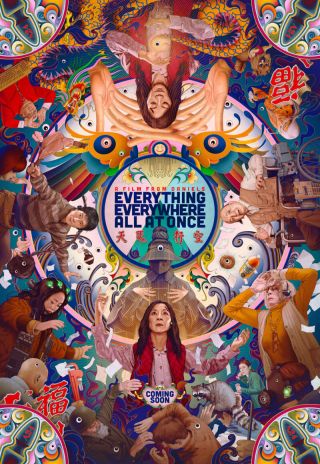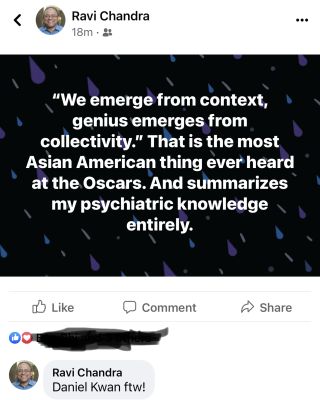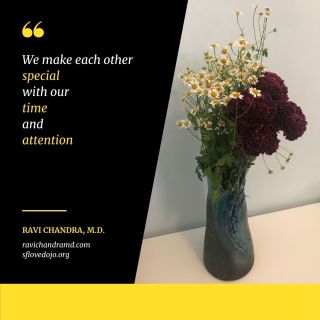Attachment
Director Daniel Kwan: "Genius Emerges From the Collective"
Kwan's Oscar acceptance speech highlights the power of interdependence.
Posted March 13, 2023 Reviewed by Devon Frye

Daniel Kwan and Daniel Scheinert (“The Daniels”) won the Best Directors Oscar for their film Everything Everywhere All At Once. EEAAO took home a total of seven Oscars for their 11 nominations—more “above the line Oscars than any film in the 95-year history of the awards," per The New York Times, including wins for the incredible Ke Huy Quan, Jamie Lee Curtis, and Michelle Yeoh.
The 95th Oscars was a wonderful breakthrough moment for Asian Americans. We will be riding this energy for some time, after the rampant anti-Asian hate and violence we have experienced in the last 3 years and the marginalization, stereotyping, and exclusion of all of American history.
I was particularly moved by the Daniels’ speeches. Daniel Scheinert thanked his parents for fostering his creativity, including dressing in drag, which he emphasized “is a threat to nobody!” pushing back against the fears of some far-right conservatives that in fact threaten the safety of trans and other LGBTQ+ people.
Daniel Kwan delivered what I pronounced was the “most Asian American thing ever heard at the Oscars.”
“I know every director agrees with me when I say a director is nothing without their incredible cast and crew—this is my family, my friends! If our movie has greatness and genius, it is only because they have greatness and genius flowing through their hearts and souls and minds, and they gave that precious gift to our film.
The world is opening up to the fact that genius does not stem from individuals like us on stage, but rather genius emerges from the collective. We are all products of our context. We are all descendants of something and someone.
And I want to acknowledge my context, my immigrant parents, my father who fell in love with movies because he needed to escape the world and thus passed that love of movies on to me. My mother who is a creative soul who wanted to be a dancer, an actor, a singer, but who could not afford the luxury of that life path and then gave it to me.
My incredible brothers and sisters who helped me survive the chaos of childhood. My friends from high school… The RCCC ["Richardson Court" where he grew up, RC] who taught me the liberating freedom of creativity and joy, and your DNA is in this film as well.
My incredible son Gio, you rearrange my DNA every day, and it’s awful and beautiful every single time. If you ever watch this I hope you know you never have to live up to this standard. This is not normal. This is kind of crazy. I will love you no matter what.
And lastly, I just want to go back to my original point. There is greatness in every single person. It doesn’t matter who they are. You have a genius that is waiting to erupt. You just need to find the right people to unlock that. Thank you so much to everyone who has unlocked my genius. This means so much to us! Thank you to the Academy!”

Asian Americans have been noted in psychological research to be more interdependent than individualistic. When asked, Asians and Asian Americans report that relationships are more foundational to happiness, while White Americans are more likely to say achievements matter most.
But despite what they say, the Harvard Grant Study indeed found that relationships are central to happiness for other Americans as well—it’s just that many of them discover this over time. As Joseph Campbell said, many men in particular find they have been “leaning their ladder against the wrong wall” for much of their lives.
Other cultures, including African, Latinx, and European cultures, tend to similarly value relationships. America has been a significant outlier, per research by psychologists W. Keith Campbell and Jean Twenge, who point to the perceptions that Americans are more narcissistic and antagonistic, as rated by both Americans and residents of other countries.
The experience and philosophy of interdependence has emerged throughout the world. John Donne wrote, “no man is an island, no man stands alone.” The Ubuntu proverbs from modern Africa state “people become people through other people,” and “I am because you are.” John Bowlby, famed psychiatrist, wrote “there is no such thing as a baby. There is a baby and someone,” reminding us that we are born into relationships, not as individuals.
This extends to our cultural context as well. I wrote in Facebuddha: Transcendence in the Age of Social Networks, “we are who happens to us, and what we make of the happening.” Martin Luther King, Jr. said, “I cannot be what I ought to be unless you are what you ought to be.” We depend on each other. We lean, and we lift.
Kwan summarized a pearl of humanitarian wisdom and truth that is critical for our times. All of my patients with social anxiety and uncertain self-worth worry whether others are fundamentally aggressive or benevolent. The truth is that we all contain seeds of both—though I think we tend to lean towards the benevolent, if imperfectly and dependent on our cultures, contexts, and upbringings. As psychologist Dacher Keltner points out in his book Born to be Good, we can bring out the good in each other, the Confucian concept of jen, referring to kindness, humanity, and reverence.

As Kwan puts it, we can bring out the genius of each person. I think we do this by giving each other time, attention, appreciation, and affection. We make each other special with our time and attention. We make each other genius, even.
Thank you, Daniels!
(c) 2023 Ravi Chandra, M.D., D.F.A.P.A.
References
Chandra R. "Crazy Rich Asians" and the Asian American Psyche, Part II. Psychology Today, August 18, 2018.
Ravi Chandra's Remarks at Mindful Self Compassion Teacher Forum on Racism & "Mudfire," July 30, 2020, in which I discuss community-centered ego vs. individualism, and even sing a bit of Dennis Brown's remix of John Donne!


